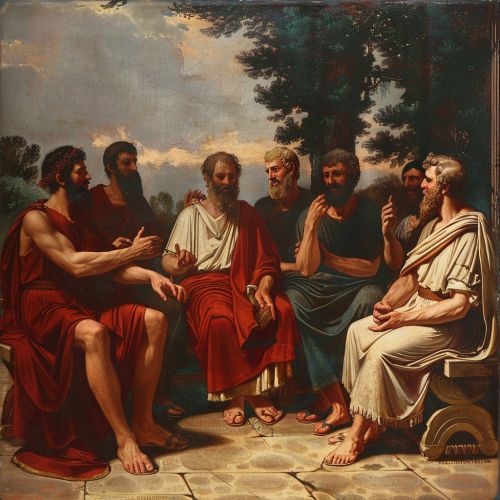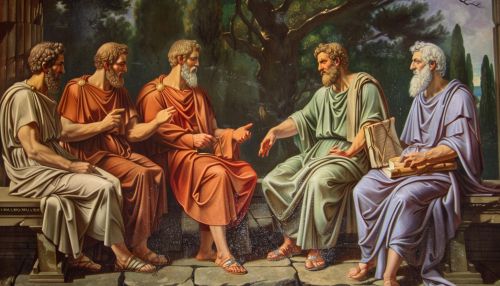Greek Philosophy
Origins and Development
Greek philosophy, as a unique field of study, began around 6th century BCE in the ancient Greek city-states, particularly Athens. The earliest philosophers, known as the Pre-Socratics, introduced a shift from mythological explanations of the world to reasoned argument and inquiry. These thinkers sought to understand the principles and elements that constitute reality, often focusing on questions of being, change, and the nature of the cosmos.


Pre-Socratic Philosophy
The term "Pre-Socratic" refers to philosophers who were active before the birth of Socrates. These thinkers were primarily concerned with cosmology, ontology, and metaphysics. They sought to understand the fundamental nature of the universe and the essence of being. Some of the most notable Pre-Socratic philosophers include Thales, Anaximander, Anaximenes, Pythagoras, Heraclitus, Parmenides, Zeno of Elea, and Democritus.
Thales and the Milesian School
Thales of Miletus, often credited as the first philosopher in the Greek tradition, proposed that water is the fundamental principle (arche) of all things. His student, Anaximander, proposed the concept of the "apeiron" or the indefinite as the source of all existence. Anaximenes, another student of Thales, suggested that air is the fundamental element of the cosmos.
Pythagoras and Pythagoreanism
Pythagoras is best known for his mathematical theorem, but he also contributed significantly to philosophy. He and his followers, the Pythagoreans, believed in the immortality and transmigration of the soul, and that all things are fundamentally composed of numbers.
Heraclitus and Parmenides
Heraclitus proposed that the fundamental nature of the universe is change, famously stating that "one cannot step into the same river twice". In contrast, Parmenides argued that change is an illusion and that the universe is a single, unchanging entity.
Atomism
The atomists, Leucippus and Democritus, proposed that the universe is composed of tiny, indivisible particles called atoms. This marked a significant step towards the development of the scientific method.
Classical Greek Philosophy
Classical Greek philosophy is typically divided into the Socratic period and the Hellenistic period. The Socratic period, named after Socrates, includes the work of Socrates, Plato, and Aristotle. The Hellenistic period, which followed the death of Aristotle, saw the development of several philosophical schools, including Stoicism, Epicureanism, and Skepticism.
Socrates
Socrates is perhaps the most iconic figure in Greek philosophy. He is known for his Socratic method of questioning, which was a unique pedagogical approach that involved a dialogue between teacher and student in order to stimulate critical thinking and to expose the contradictions in one's beliefs.
Plato
Plato, a student of Socrates, is one of the most influential philosophers in Western thought. His work covers a wide range of topics, including politics, aesthetics, metaphysics, and epistemology. Plato's theory of Forms proposes that non-physical forms (or ideas) represent the most accurate reality.
Aristotle
Aristotle, a student of Plato, made significant contributions to a number of fields, including logic, metaphysics, ethics, political theory, and biology. Unlike his teacher, Aristotle believed that knowledge comes from experience and that the reality we experience is not a shadow of a higher reality, but reality itself.
Hellenistic Philosophy
The Hellenistic period of Greek philosophy began following the death of Aristotle in 322 BCE and lasted until the Roman annexation of Greece in 146 BCE. This period saw the development of several philosophical schools, including Stoicism, Epicureanism, and Skepticism.
Stoicism
The Stoics, including philosophers such as Zeno of Citium, Epictetus, and Marcus Aurelius, taught that virtue is the highest good and that the wise live in harmony with divine Reason (also identified with Fate and Providence) that governs nature.
Epicureanism
Epicurus founded the school of Epicureanism, which taught that pleasure is the greatest good. However, Epicurus advocated for a restrained and moderate pursuit of pleasure, emphasizing mental pleasures over physical ones, and the avoidance of desire for the unnecessary.
Skepticism
The skeptics, such as Pyrrho, questioned the possibility of certainty in knowledge. They argued that we should suspend judgment on all matters, as we can never be sure of anything.
Conclusion
Greek philosophy has had a profound influence on Western thought. Its principles, theories, and ideas have shaped a wide range of fields, including science, politics, and education. From the Pre-Socratics' inquiries into the nature of reality, to the ethical and metaphysical explorations of the Classical and Hellenistic philosophers, Greek philosophy represents a critical period in human intellectual history.
See Also
Ancient Greek Science Ancient Greek Literature Ancient Greek Mathematics
